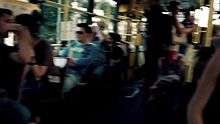Esperanto music
|
Culture and media |
|
Related topics |
|
Wikimedia Portal · Task force Esperanto Wikipedia (Vikipedio) Vikivortaro · Vikicitaro · Vikifontaro Vikilibroj · Vikikomunejo Vikispecoj · Vikinovaĵoj |

Esperanto music is music written, recorded, and performed in Esperanto, a constructed language used for international communication. The term is sometimes also used to encompass music which refers to Esperanto in some way.
The linguistic and musical quality of Esperanto music varies. In some cases, music sung in Esperanto is performed by non-Esperantists, who are rendering the words phonetically from a phonetic transcription or parroting words recited to them by an Esperanto speaker.
The history of Esperanto began not long after the publication of the first Esperanto book (La Unua Libro), and continues to the present day. Online sources of Esperanto music include last.fm, SHOUTcast Radio,[1] Music Panorama;[2] and there is an Esperanto music wiki, Kantaro-Vikio.[3]
Radio
Muzaiko is a 24-hour Internet radio station completely in Esperanto.[4][5]
Classical music
- Lou Harrison, who incorporated styles and instruments from many world cultures in his music, used Esperanto titles and/or texts in several of his works, most notably La Koro-Sutro (1973).
- David Gaines used Esperanto texts for his Symphony No. 1 (Esperanto) for mezzo-soprano and orchestra (1994–98) and Povas plori mi ne plu (I Can Cry No Longer) for unaccompanied SATB choir (1994).
- Montagu C. Butler
Musicians, singers and Bands
Songs
Music companies and publishers
- ESP-Disk
- Vinilkosmo
- Floréal Martorell
- Brazila-Esperanto-Ligo
- Edistudio
- Nigra Kato
- Rusa Esperantista Unio
Events and projects
- Vinilkosmo kompil'
- Kolekto 2000
- Esperanto Subgrunde kompil'
- FESTO (Esperanto meeting)
References to Esperanto in music
- Slovak band TEAM released an entire album in Esperanto.
- "The Crystal Theme" from the opening of Final Fantasy XI was sung in Esperanto ("Memoro de la Ŝtono")
- Kurt Elling wrote a vocalese song called "Esperanto" based on the Vince Mendoza composition "Esperança". Elling explains on his album Live in Chicago (Blue Note) that the lyrics were written while he was under the impression that it was titled "Esperanto" and only later found out the original title, which is the Portuguese word for 'hope'.
See also
References
External links
- Vinilkosmo - Online shop for Esperanto music. (MP3 FLAC uploads)